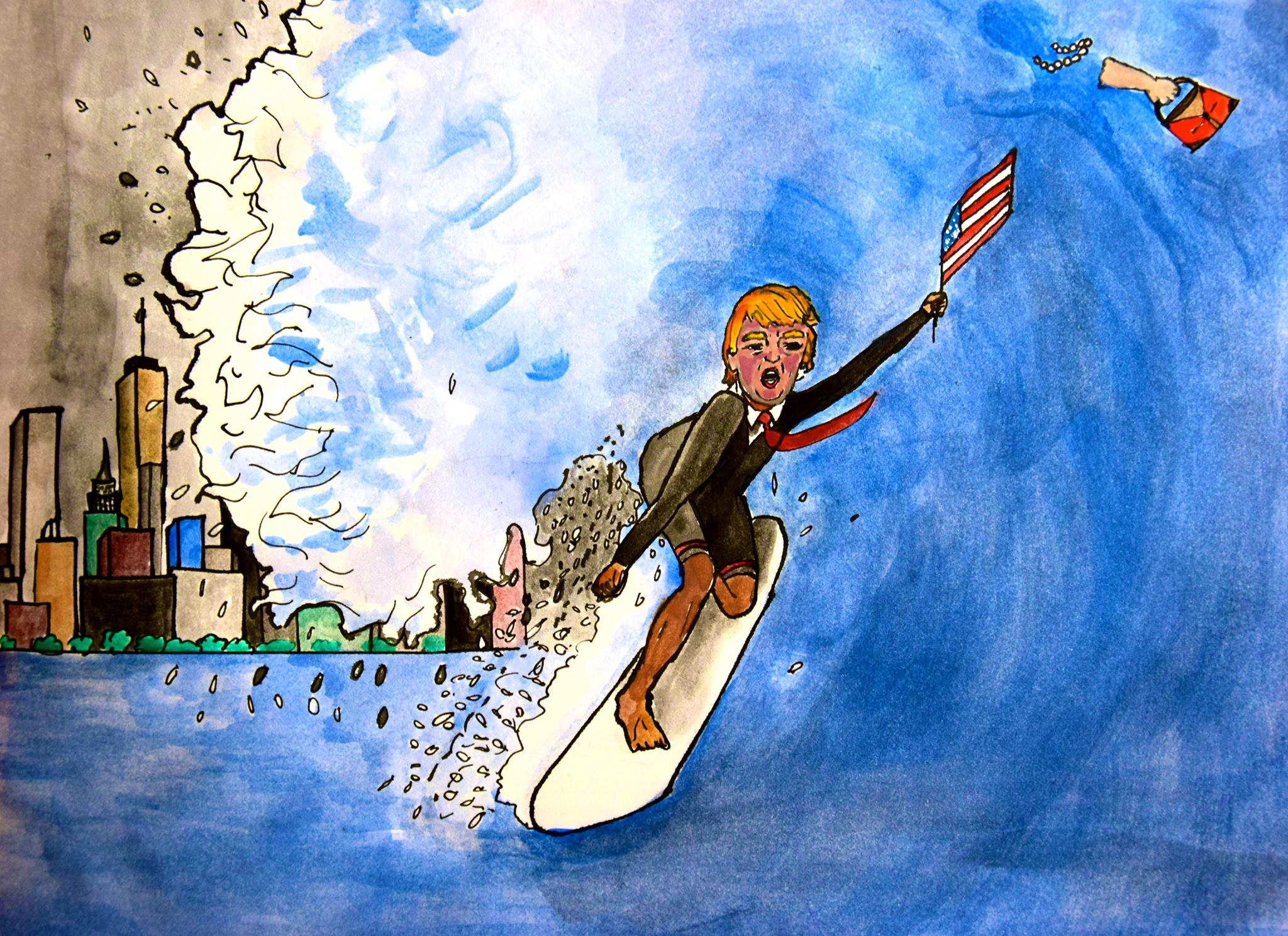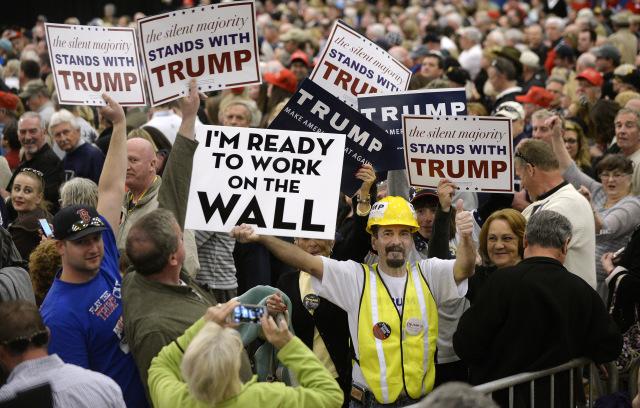
Donald Trump rode the Class wave
By Thomas de Réals
Getting a read on what made Trump president a few weeks back is not easy from good ol’ France. While pondering and discussing my past articles, I decided I needed to delve a little deeper into the issue.
In many instances, it has been written that the election of Trump was the result of the resilience of a group of people still bathing in a culture based on patriarchy, guns and the inability to face the complex issues and ways of progress. I have indulged in that kind of easy writing myself. However, through studying the reactions of the media, politicians and the good people of the internet in general I have since come to the realization that of course, things were a tad more complicated than that.
What has led someone as apparently deplorable as Donald Trump to gain the highest office there is? What does it tell us about the world as perceived by those who got him there, and who are these people? It seems that many more than the racists, xenophobes and bigots that survive in any society are actually to blame in this affair, including the hammering of the ever-more present liberal doxa that, to some, has become insufferable.
The first element for a solid explanation
The first thing to consider is that when deciding about their lives, people tend not to care about rationality or the grand scope of things, as evidenced in this article.
The article presents us with the ultimatum game: give player A a hundred dollars, which he has to split with player B. He can give in any proportion he likes, but if B refuses the split, neither of them get anything.
Now, any rational thinker would accept any sum, even a dollar, next to getting nothing at all. But interestingly enough, very few people accept a deal that is under 40-60. Which tells us one very important thing: people prefer to see the house burnt down than to accept an offer that feels unfair. At least then no one gets anything. The cards are reshuffled.
What does it mean in context?
Well, thanks in no small part to globalization, the great pie that is the wealth of the world as a whole has grown exponentially. This tide, however, has not risen all boats equally.
Some, our player As, have benefitted from it much more than others: the “1%”, the elites, etc.
Player Bs however have seen their share grow very little in a system they feel systematically helps player A at the expense of themselves. Since growth began to stall in the 1970s, the revenue began to flow overwhelmingly towards the wallet of the “1%” Bernie Sanders was so adamant about. Some of them began to see competition rise from China, India, Indonesia, etc. after the Berlin Wall went down, and the automatization of good paying jobs further fed that feeling.
The player As are the elites, the Bs the rest of the world, and our hundred dollars was the evergrowing wealth that stemmed from the enormous increase in trade and transactions that started in 1950.
So the split has been set by those who had the wealth and power. Truth be told, our player As advocated a system that they probably felt was right, from their vantage point. Everyone was better off, just some more so than others, but it was still better than nothing, right?
Very, very wrong. And player A has to review its strategies in depth because what often happens when A ignores B is B overthrows A, and the result seldom is very pretty.
Voting in favour of the Brexit or for Trump was a way of refusing that split, and of dislodging the player As from their comfortable positions. That election represented a way out of a system that seemed rigged against them from the get-go, and it probably was.
First media mistake: Who is player B?
Contrary to popular misconception, most of Trump’s voters are not poor, uneducated misogynists and xenophobes. This article by Joan C. Williams from the Harvard Business review gives us a closer look at what actual middle-class really means.
We get an insight on blue-collar America, or White Working Class (WWC) which, as the name suggests is mostly composed of white families with medium income. More often than not, these families rely on the patriarch, who works one or more of these jobs you do not work for passion, but for the food it brings to the table. That working class does not believe in the American Dream, it relies on it.
And within that middle class lies a resentment of what they call “professionals”, as stated by Michèle Lamont, in The Dignity of working men. These are the white-collar people who boss them around, talk fancy and have become oblivious to the carnal nature of their relationship to their land. They are accused of having lost sight of reality, of the fundamental need to work for every cent, they lack that pretty self-explanatory, aforementioned “dignity” of the person who earns its keep in society.
Which is why their dream, according to this article, is not to be like these rich fellas but to earn more in order to behave the same, just with more slack. They dream of owning their own business, and finally be the one giving the orders. Which is why they admire people who have succeeded and who, in their eyes, have deserved it.
That is why we have heard so many times that Donald Trump “Tells it like it is”. It doesn’t matter that he sometimes spouts out lies and insults like a deranged orangutan with Tourette Syndrome, what does matter is that he says what he thinks in the unpolished, unsophisticated way the WWC respects. That is what has gotten him the much-derided nickname of “blue-collar billionaire”. His personality has made him one of their own, especially when opposed to the establishment, which is all white-collar, untrustworthy people.
Which brings us to the next point:
How had A managed its rule?
What seem clearer now is that what happened during this election is a matter of class, rather than race or gender.
Player A, as mentioned, is the establishment in all its glory: it’s the dynasties (or would-be dynasties) of Clintons and even Bush, the Washington insiders who claim to know the big picture and what’s best for the world. And in a noble effort to keep balance, that “elite” has worked quite hard to help the poorest classes in the country, from Roosevelt’s Food Stamps to Obama’s Affordable Care Act.
The poor are decidedly better off, and the elites have had much more than their fair share: the problem lies in between. Most reforms have done little to improve -or have indeed worsened- the lives of the middle class, those who are not targeted by these reforms because they earn just above the threshold.
A’s foremost mistake was to think that America as a whole was satisfied enough to be chiefly concerned with social issues. Focusing on gay marriage or transgender toilets for instance, instead of the economy, just fuelled the resentment from a WWC that felt the government was out of touch with them and reality. They felt threatened by a world that was changing, culturally and socially, while they were busy breaking even, a task they felt was made harder by the delocalization of their jobs through careless globalization. They longed for stability and respect, in a country were they were mostly mocked by the media for being dense and backward-looking. They resented the elites and the poor, because the middle class paid for the poor’s health insurance and were too rich to get any of its benefits.
Which is why:
Hillary Clinton was the worst possible candidate.
The main problem with the Democratic party in particular was its progressivism, with its sights on a globalized world and a hammering of a particular view on society. That view, though admirable, and the perceived contempt with which it was implemented, have deepened the trench between classes.
Hillary lost because she felt untrustworthy (emails scandal, downplaying her illness, etc.), but she mainly lost because she was smug. Because she called the Trump-inclined WWC a “basket of deplorables”. Because she changed her accent to fit the crowd she was in, because in every debate facing Trump she couldn’t hide that look on her face that said “I know better, and so should you”. She did very little to address their concerns, and in the end, even WWC women voted for Trump over Clinton in outstanding proportions: 62% to 34%.
Obviously, being a woman was not enough to win them over, even with Trump being overtly sexist. Because she was a woman of a different class, and, as Joan C. Williams argues, because her attitude showed that “even women from her class can treat working class men with disrespect”. To say that sexism and racism were absent during this election would be dangerous, but the main thing, as I hope you will agree, was class resentment, which sometimes, through careless logic leaps, devolves into racism and sexism. Hillary was a really bad candidate, and I , like many people, believe that Bernie Sanders would have crushed Trump senseless.
Still, we could have seen this coming, couldn’t we? It seems so obvious now.
Not quite, though:
The main problem was the general mindset during this election. Here’s an insight on why the polls were so, so wrong:
Part of what is explained here is that given the attitude of the governing class and the pundits of political correctness, it became very hard for people to actually give straight answers to reporters and pollsters: for instance, the average woman would have had a hard time admitting to supporting Trump, given all the scandals. A number of biases have led people to give misleading answers – a phenomenon called socially desirable responding- which were interpreted by overconfident politicians and media –attitude polarization– who could not see past Trump’s apparent stupidity and complete lack of respect for the rules of the game.
In hindsight, it seems that what mattered in what he said was not so much the content as its sheer unbiasedness. He was a rebellious voice, if not theirs, and it rebelled against the politically correct and all its might.
Which gave strength to Donald’s pledge to “Drain the swamp”, which means rid Washington of its smug, out-of touch and self-serving insiders. A pledge he is failing to act upon, and the people he is surrounding himself with is what’s truly worrisome, now that’s he is president-elect, but that’s another topic entirely.
Here’s a treat for those who read/skipped to the end:
For more on that subject :
http://www.vox.com/policy-and-politics/2016/11/17/13626514/trump-systemic-corruption
https://www.washingtonpost.com/news/wonk/wp/2016/11/11/donald-trump-and-the-end-of-history/
Sources :
https://medium.com/@jamesallworth/brexit-trump-and-the-ultimatum-game-2237e17de71c#.lvztldg6o
http://theconversation.com/et-puis-il-y-eut-trump-67606
https://hbr.org/2016/11/what-so-many-people-dont-get-about-the-u-s-working-class
http://www.nytimes.com/2016/11/11/opinion/what-i-got-wrong-about-the-election.html?_r=0
https://hbr.org/2016/11/blindsided-by-trumps-victory-behavioral-science-explains
Special thanks to Frédéric Fréry, professor at ESCP Europe, for the articles and insights he provided.


